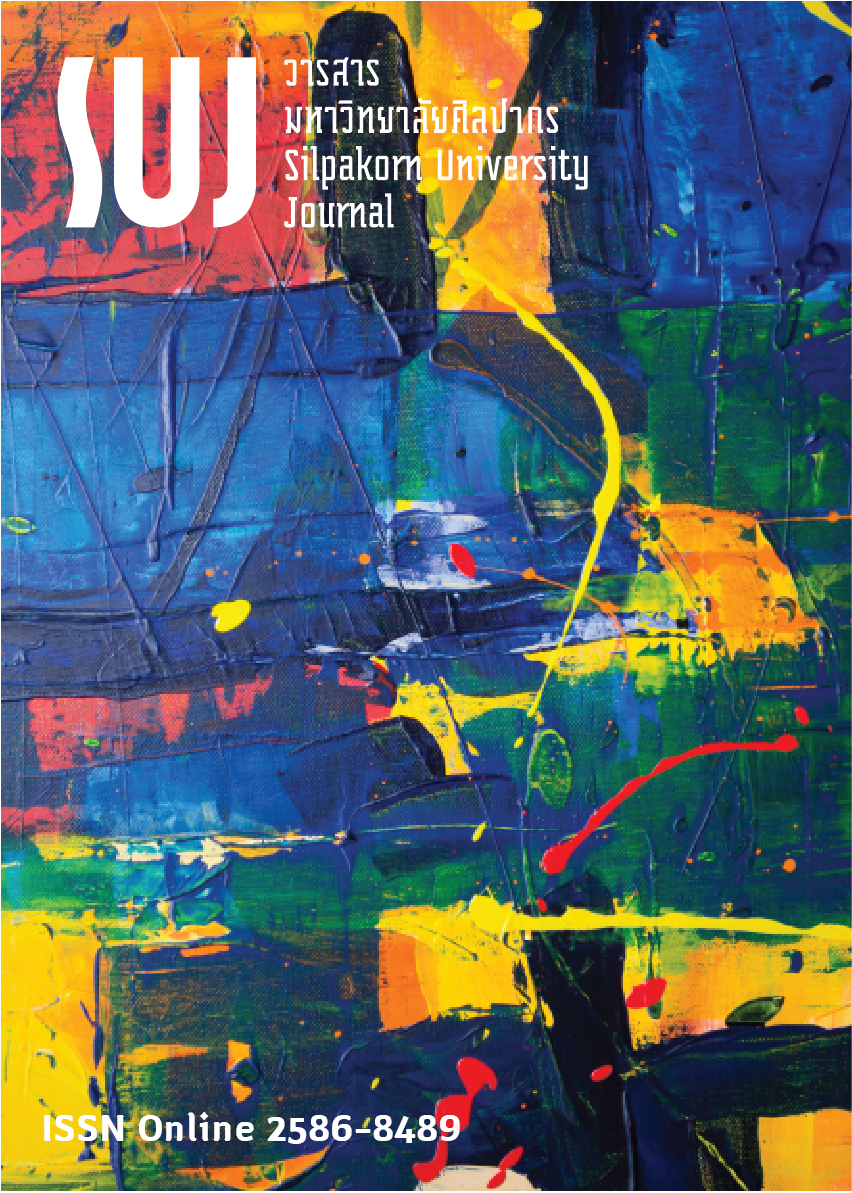ปัจจัยที่ส่งผลต่อการรู้ดิจิทัลของนักศึกษาปริญญาตรีมหาวิทยาลัยเทคโนโลยีราชมงคลอีสาน (Factors affecting digital literacy for undergraduate students, Rajamangala University of Technology Isan)
Main Article Content
Abstract
บทความวิจัยนี้มีวัตถุประสงค์เพื่อศึกษาความคิดเห็นของผู้บริหารและอาจารย์ที่มีต่อปัจจัยที่ส่งผลต่อการรู้ดิจิทัลของนักศึกษาปริญญาตรีมหาวิทยาลัยเทคโนโลยีราชมงคลอีสาน กลุ่มตัวอย่างของงานวิจัย คือ ผู้บริหาร จำนวน 24 คน และอาจารย์ จำนวน 203 คน โดยเป็นบุคคลในสังกัดมหาวิทยาลัยเทคโนโลยีราชมงคลอีสานทั้ง 4 วิทยาเขต คือ ศูนย์กลางนครราชสีมา วิทยาเขตขอนแก่น วิทยาเขตสกลนคร และวิทยาเขตสุรินทร์ งานวิจัยนี้ใช้วิธีการสุ่มตัวอย่างแบบแบ่งชั้น เครื่องมือที่ใช้ในการเก็บรวบรวมข้อมูล คือ แบบสอบถาม การวิเคราะห์ข้อมูลใช้สถิติเชิงสำรวจ ได้แก่ ค่าเฉลี่ย และค่าส่วนเบี่ยงเบนมาตรฐาน ผลการศึกษาพบว่า ความคิดเห็นของผู้บริหารและอาจารย์ที่มีต่อปัจจัยที่ส่งผลต่อการรู้ดิจิทัลของนักศึกษามหาวิทยาลัยเทคโนโลยีราชมงคลอีสานมีค่าเฉลี่ยเรียงลำดับ ดังนี้คือ ด้านการตระหนักรู้ของนักศึกษาอยู่ในระดับมากที่สุด มีค่าเฉลี่ย 4.33 รองลงมา คือ ด้านสิ่งแวดล้อมภายนอก และด้านนโยบายของมหาวิทยาลัยอยู่ในระดับมากที่สุด มีค่าเฉลี่ย 4.32 ด้านบุคลากรอยู่ในระดับมากที่สุด มีค่าเฉลี่ย 4.31 ถัดมา คือ ด้านโครงสร้างพื้นฐานอยู่ในระดับมากที่สุด มีค่าเฉลี่ย 4.26 ด้านการบริการวิชาการอยู่ในระดับมากที่สุด มีค่าเฉลี่ย 4.21 และด้านกระบวนการพัฒนาอยู่ในระดับมาก มีค่าเฉลี่ย 4.20 ตามลำดับ จากผลการวิจัยชี้ให้เห็นว่า มหาวิทยาลัยควรสนับสนุนและให้ความสำคัญกับทุกปัจจัย โดยเน้นในเรื่องการตระหนักรู้ดิจิทัลเพื่อเป็นแนวทางในการพัฒนาทักษะการรู้ดิจิทัลให้กับนักศึกษา กำหนดเป็นนโยบายส่งเสริมและพัฒนาโครงสร้างพื้นฐานด้านเทคโนโลยีสารสนเทศให้ครอบคลุม รวมถึงการกำหนดแผนกลยุทธ์ในการผลิตบัณฑิตให้มีสมรรถนะการรู้ดิจิทัลเพื่อเป็นประโยชน์ต่อการทำงานต่อไป
This research aims to study the opinions of administrators and faculty members on factors affecting digital literacy of undergraduate students at Rajamangala University of Technology Isan. The sample consisted of 24 administrators and 203 faculty members from the Rajamangala University of Technology Isan that includes the main campus in Nakhon Ratchasima, Khon Kaen Campus, Sakon Nakhon Campus, and Surin Campus. This research used stratified sampling. Questionnaires were used to collect data. Statistical analysis using survey statistics was mean and standard deviation. The results of the study showed that the opinions of administrators and faculty members on factors affecting digital literacy among students at Rajamangala University of Technology Isan was that the student’s awareness was 4.33 external environment and university policy. The highest level was 4.32, followed by personnel at the highest level, 4.31 average, followed by infrastructure at the highest level, with an average of 4.26, followed by academic service at a high level with an average of 4.21, development process at the high level with an average of 4.20 respectively. According to the research results, the university should support and focus on all factors with an emphasis on digital awareness as a guideline for developing digital literacy skills for students and set a policy to promote and develop comprehensive information technology infrastructure. Moreover, a strategic plan should be formatted to produce graduates with digital literacy which will be useful in the future.
Downloads
Article Details

This work is licensed under a Creative Commons Attribution-NonCommercial-NoDerivatives 4.0 International License.
References
Bawden, D. (2008). Origins and Concepts of Digital Literacy. In C. Lankshear, & M. Knobel (Eds.), Digital Literacies: Concepts, Policies & Practices. (pp. 17-32). New York: Peter Lang Publishing.
Buckingham, D. (2005). The Media Literacy of Children and Young People. [Online]. Retrieved March 2, 2020 from https://www.researchgate.net/publication/253736824_The_Media_Literacy_of_Children_and_Young_People
Glister, P. (1997). Digital literacy. New York: Willey.
Haruehansapong, Kanjana. (2019). Digital Literacy of Undergraduate Students at Walailak University (การรู้ดิจิทัลของนักศึกษาระดับปริญญาตรีมหาวิทยาลัยวลัยลักษณ์). Journal of Learning Innovation, 5(2): 27-40.
Kruthasen, Ulichsa. (2013). The Development of the Media Literacy Learning’s Process Approach for the Youth Leader (แนวทางการพัฒนากระบวนการเรียนรู้เท่าทันสื่อ). Veridian E-Journal, Silpakorn University, 6(3): 276-285.
Leahy, D., & Dolan, D. (2014). Digital Literacy: A Vital Competence for 2010?. In N. Reynolds, & M. Turcsányi-Szabó (Eds.), Key Competencies in the Knowledge Society, (pp. 210-221). New York: Springer.
Leenaraj, Bhornchanit. (2017). Digital Literacy Skill for Developing Learning Quality (ทักษะการรู้ดิจิทัลเพื่อพัฒนาคุณภาพการเรียนรู้). Journal of T.L.A. Bulletin, 61(2): 76-92.
Ministry of Digital Economy and Society. (2016). Digital Thailand (แผนพัฒนาดิจิทัลเพื่อเศรษฐกิจและสังคม). Bangkok: Ministry of Digital Economy and Society.
Neadsuebsai, Pirunphak, & Karaked, Nawarat. (2017). Factors Affecting University Development into a Digital University (ปัจจัยที่ส่งผลต่อการพัฒนามหาวิทยาลัยสู่การเป็นมหาวิทยาลัยดิจิทัล). Research report, Rajamangala University of Technology Phra Nakhon, Bangkok, Thailand.
Office of the Civil Service Commission. (2017). The Digital Skills of Government Officials and Government Personnel for the Transformation of the Public Sector to a Digital Government (ทักษะความเข้าใจและใช้เทคโนโลยีดิจิทัลของข้าราชการและบุคลากรภาครัฐ). [Online]. Retrieved March 2, 2020 from https://www.ocsc.go.th/node/4229
Policy and Planning Division of Rajamangala University of Technology Isan. (2017). Strategic Plan for the Development of Rajamangala University of Technology Isan 4-year (2018-2021) (แผนยุทธศาสตร์การพัฒนามหาวิทยาลัยเทคโนโลยีราชมงคลอีสาน ระยะ 4 ปี (พ.ศ. 2561-พ.ศ. 2564)). Nakhon Ratchasima: Rajamangala University of Technology Isan.
Rajamangala University of Technology Phra Nakhon. (2017). Development strategy of Rajamangala University of Technology 5-year (2018-2022) Digital Economy and Society Project (ยุทธศาสตร์การพัฒนามหาวิทยาลัยเทคโนโลยีราชมงคล ระยะ 5 ปี (2561-2565) โครงการดิจิทัลเพื่อเศรษฐกิจและสังคม). Bangkok: Rajamangala University of Technology Phra Nakhon.
Srisa-ard, Boonchom. (2002). Introduction to Research (การวิจัยเบื้องต้น) (7th ed.). Bangkok: Suweeriyasarn.
Techataweewan, Wawta, & Prasertsin, Ujsara. (2016). Development of Digital Literacy Test for Undergraduate Students (การพัฒนาแบบวัดการรู้ดิจิทัลสำหรับนักศึกษาระดับปริญญาตรี). Research report, Srinakharinwirot University, Bangkok, Thailand.
Tuamsuk, Kulthida, & Subramaniam, M. (2017). The Current State and Influential Factors in the Development of Digital Literacy in Thailand’s Higher Education. Information and Learning Science, 5-6(118): 235-251.
UNESCO. (2018). A Global Framework of Reference on Digital Literacy Skills for Indicator 4.4.2. Canada. [Online]. Retrieved March 2, 2020 from http://uis.unesco.org/sites/default/files/documents/ip51-global-framework-reference-digital-literacy-skills-2018-en.pdf


